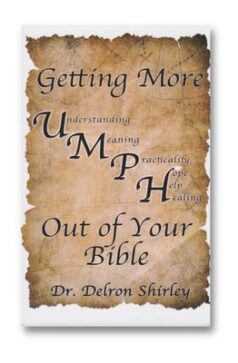In Joshua chapter seven, we read the interesting story of Joshua’s second conquest as he entered the Promised Land — his attack on the city of Ai, a city whose size is characterized by its tiny, little name. The surprising turn of events in this story is that the men of this seemingly insignificant municipality soundly defeated the army of the mighty nation of Israel in their first encounter. However, on his second attempt, Joshua was able to obliterate the army that had just routed him from the battlefield. As we read through the chapter, we learn a number of principles that can be readily applied to the confrontations in our own spiritual pilgrimages.
Be a Team Player
The chapter opens with a quick preview into the future by introducing an incident that has already occurred but will not be exposed until later in the chapter. Perhaps the summary statement made about the incident is tossed out in this seemingly out-of-sequence passage because it reveals an important principle we should glean from the story when it is told in its entirety. Verse one says that Israel committed a trespass because of Achan’s disobedience in taking “the accursed things.” The story behind this allegation is that the people of Israel were commanded not to take any loot or booty from Jericho when they invaded the city because everything in the city was to be considered “accursed.” However, Achen secretly spirited away some gold, silver, and expensive clothing that he concealed under the floor of his tent. This introductory line doesn’t explain the story or even describe the details of how Achen had erred in relationship to “the accursed things”; it simply states that God was angered by the incident. The most outstanding truth we learn from this sentence is that God held the entire people accountable for this one man’s sin. The sentence does not say that Achen alone was responsible for the trespass; rather, it blatantly proclaims that the entire children of Israel committed a trespass regarding “the accursed things.”
When I ponder this remarkable truth, I am reminded of a Jewish parable of a gentleman on a boat at sea. As the vessel sailed through the open waters, the gentleman pulled out a drill and began to bore a hole through the flooring and into the hull of the boat. Panicked, the other passengers rushed him, screaming that he must be insane to try to sink their ship. His reply was simply, “But, I’m only making the hole under my own seat!” The moral of the story is obvious and becomes even more so when we couple it with the New Testament analogy that we are all part of the same united whole — the Body of Christ. Just as a hole under one seat can sink the entire ship, a single missing, diseased, or injured member can cripple, or even kill, the whole body. It was from the Three Musketeers that we learned the slogan, “All for one, and one for all,” but it is from this verse that we see the impact of how one man’s sin can cause everyone to suffer the consequences. Probably more than any other team in the world, the Body of Christ must learn that each one must live for the entire community and that the entire community must live for the benefit of each individual. In reality, it does take a village to raise a child.
Don’t Get Too Cocky About Your Successes
Once we get past the introductory verse, we launch into the action of the chapter. Fresh from his colossal victory over Jericho, Joshua was primed for his next attack. The scouts he sent to Ai returned from their recognizance mission with the report, “Don’t weary all the people there, for the people of Ai are few.” Apparently, they were overly cocky after the conquest of Jericho, and so was Joshua! His plan was to send only a small contingency to handle the matter. Unfortunately, this was the wrong plan, and his band of warriors were easily overcome as the men of Ai defended their city and possessions. We can save ourselves a lot of pain and suffering by learning from Joshua’s mistake and carefully guarding against the pride that can — and will — set us up for a great defeat and devastating fall. (Proverbs 16:18, I Corinthians 10:12)
Don’t Play the Blame Game
We must never accuse others or even God for our failures. In verse seven, we see Joshua making another common, yet debilitating, error; he blamed God for the tragedy. Blame passing has been a universal character flaw in mankind literally from the first pages of human history. After his rebellion in the garden, Adam pointed an accusing finger at his wife and ultimately at God Himself as he passed the blame off on “the woman You gave me.” (Genesis 3:12) Because Adam was not a big enough man to take his own blame, he tried to turn the spotlight on Eve and then even shift the focus on God Himself for ever having created her in the first place. If we will only listen, we can hear the echoes of this same blame game in our everyday lives as people constantly question how a good God can allow bad things to happen to good people. All too many of us blame Him for every evil thing that happens in our lives. According to most people, it is God’s fault that diseases, bankruptcies, deaths, and accidents plague their lives. On the contrary, God is a good God who has a good plan for our lives (Jeremiah 29:11) and is constantly offering us good gifts. (James 1:17) If we want to move beyond the tragedies and failures that occur in our lives, we must move beyond the blame barrier and recognize that these things are not God’s fault. If we want Him to get us out of the problems and help us get past them, we cannot continue to blame Him for them.
Remember that God’s Own Reputation is at Stake When His Children Fail
In verse nine we are introduced to a powerfully revolutionary thought: God has a reputation, and it is at stake in the events that happen in our lives. Joshua had the audacity to remind God that His own reputation would be brought into question by the pagan nations if the people of Israel were utterly destroyed. Although this might seem like a ridiculously bold stance on Joshua’s part, he was simply following in the footsteps of his mentor Moses. After the people had sinned by making the golden calf, Moses used exactly this same strategy to dissuade God’s anger when he reminded the Lord how the Egyptians would mock a god who could deliver the people from Egypt but not get them through the desert. Actually, the scriptures are replete with references to the fact that God repeatedly acts on behalf of His people for His own name’s sake. (I Samuel 12:22; Psalms 23:3, 25:11, 31:3, 79:9, 106:8, 109:21, 115:1, 143:11; Isaiah 48:9, 48:11; Jeremiah 14:7, 14:21) In writing to the Ephesians, Paul described the Christian’s life as predetermined for the praise of His glory; in other words, what God is doing in, for, and through us is supposed to bring good marks to His name. Jesus told us that our good works would result in men’s glorifying our Father. It is the good things, not anything evil, that happen to and for us that bring glory to God, honor to His name, and credit to His reputation.
Quit Complaining about Your Failures and Problems
In verse ten, God answered Joshua with a statement that could be very loosely translated, “Quit your bellyaching!” Just like Moses before him (Exodus 14:15) and Elijah who would follow him (I Kings 19:18), Joshua needed the Lord to tell him to get his focus off the problem and redirect his attention to working toward the solution.
I was once part of a group that met early each morning to share requests and then lift up the needs in prayer. Each day, they would go around the circle and list all the needs. Then one member of the group would be asked to intercede. He would then reiterate all the needs as he mentioned them in prayer to the Lord. Finally, my day came to lead the prayer. I agreed only if they would allow me to do things a little differently. With a nod from the members, I explained that I didn’t think that we should spend our time praying the problems but should use the occasion to pray the answer. I challenged each person to give me a biblical promise relating to the need rather than stating the need itself. Rather than talking about someone’s uncle with cancer, I insisted that we talk about the provision Christ had made for the uncle’s condition. When I taught them to pray the answer, it changed the entire complexion of the prayer group. They moved from making announcements of bad news to making proclamations of the Good News. They began to pray with anticipation rather than just out of obligation. Moreover, they began to experience power rather than simply commiserating with needs.
Remember that You are a Covenant Person
Your success or failure depends on whether you live by your covenant obligations and invoke its promises.
In our story from the book of Joshua, God goes on to say that Israel’s problem was that they had violated His covenant. If breaking a covenant is a key to failure, then keeping that covenant is certainly a key to success. Deuteronomy chapter twenty-eight explicitly confirms this evaluation by listing tremendous blessings which will abound toward covenant keepers and equally plentiful curses which will invade the lives of those who violate the covenant.
The conflict between David and Goliath is a splendid illustration of the difference a covenant makes. When David went out to fight Goliath, he must have had x‑ray vision since he was able to look beyond the giant’s shield and behind his armor to see something that nobody else had noticed about the man. Nobody else called him “an uncircumcised Philistine”; only David was able to see his spiritual condition. David saw that Goliath was not part of a covenant with God; therefore, it didn’t matter how big he was, or what kind of record he had as a warrior, or how much armor he had, or how strong he was. None of that was going to be important because he was not in a covenant with God. David had the total advantage because he was in a covenant. This young lad had a spiritual perspective and could see that he had an upper hand. David remembered that, unlike the Philistine, he did have a covenant. In Genesis chapter twelve, God had promised Abraham that everyone who cursed him or his seed would be cursed. David knew that he was part of this covenant heritage; therefore, he was blessed by God and whoever came against him would be cursed. The moment Goliath had defied the army of the living God, he had placed himself under a curse and was, therefore, subject to David. David also knew from Deuteronomy chapter twenty-eight that if he would diligently obey the voice of the Lord to observe carefully all His commandments that the Lord would set him above all the nations of the earth — whether they were pygmies or giants. David understood that he was in a covenant and that he was, therefore, predestined to be seated high above all principalities and all opposition. He understood that he was predestined to be a success and not defeated.
Make Sure that you Have a Proper Perspective on Possessions, Actions, and Attitudes
In verse twelve, God said that the people would never succeed until they destroyed “the accursed things.” When we begin to think about this directive, we must first recognize that the things, in and of themselves, were not evil; it was the relationship the people had toward them that made them evil. Although God had directed the people to destroy all the wealth of Jericho, He permitted them to take the bounty from Ai and other cities they invaded in their conquest. Money itself is not the root of all evil; loving it is. (I Timothy 6:10) Achen’s having the garments, the gold, and the silver would have been okay had it not been that God had given an order concerning destroying them. Once we violate our relationship with God over some material possession, carnal habit, personal agenda, or natural ambition, we replace the true and living God with that thing as our god and focus of attention. When this happens, we set ourselves up for failure because our only advocate is the weak and powerless god with which we have chosen to replace the Almighty God who once acted on our behalf.
You Can’t Hide Your Sins and Errors: Own up to Them
One of the most obvious lessons from the Ai encounter is that you can’t keep skeletons in your closet because all hidden sins will eventually be exposed. The physical lesson is illustrated in verse twenty-two when the secrets inside Achen’s tent are brought to light; however, the practical lesson is repeated time and again throughout the Bible. Numbers 32:23 proclaims, “Be sure your sins will find you out,” Luke 12:3 declares that whatever is spoken in secret will be broadcast from the house tops, Luke 8:17 promises that every hidden thing will be revealed, and Hebrews 4:13 sums up the topic by saying that we are all naked before Him with whom we have to deal.
Be Brave Enough to Try Again
The final key to failing successfully is given in the following chapter where we read the story of how Joshua regrouped and headed back to Ai. This time, he won a resounding victory and decimated the enemy. His key was that he was not afraid to act once the sin was dealt with. The battle cry of those who aim to be successful even after failure is, “Don’t be afraid to make a come back!” Proverbs 24:16 promises that although a just man may fall seven times, he can get up again!
It may be nothing more than coincidence that Joshua had seven admonitions to be strong and of good courage — three from Moses (Deuteronomy 31:6, 7, 23) and four from God Himself (Joshua 1:6, 7, 9, 18); however, it may be that these seven mandates were intended to represent the courage it takes to keep getting up after the various “Ai”s we encounter. These seven echoing commands rang in his ears so strongly that he couldn’t help but keep getting up! In verse twenty-five of chapter ten, he repeated these same words, “Be strong and of good courage,” to his captains — as, I believe, he would shout through the corridors of time to us today. They were his bywords for success and can be ours as well.










